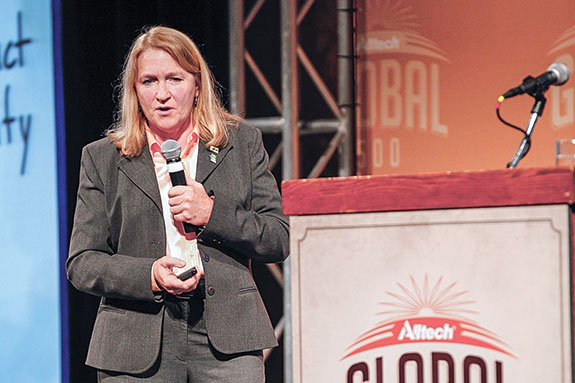When it comes to “game changers,” the dairy industry has seen its fair share. The science behind creating a gallon of milk continues to change rapidly, thanks to new technologies, and with the push for efficient and profitable operations in the current marketplace, nutrigenomics is today’s game changer producers need to consider.

Kate Jacques, director of nutrition at animal health and nutrition company Alltech , spoke to more than 500 progressive beef and dairy producers at Alltech’s Global 500 event in December.
Nutrigenomics, the study of how diet affects the gene expression, is something Jacques said will change how the agricultural world thinks about nutrition.
Jacques held up a small gene chip for the audience. “There are a very large number of genes that can be measured at once in this small chip, allowing biologists to measure animal responses to diet at the gene level,” Jacques explained. “We need to know a lot more about how all of this works if we expect to get more meat and more milk out of our animals.”
All cells have a complete set of chromosomes with identical genes, but only a fraction of these genes are expressed resulting in protein production. The gene chip gives scientists a way to measure which genes are activated to produce proteins in response to specific nutrient regimens.
Jacques said this newfound ability to observe which genes are affected by nutrition has the potential to revolutionize our approach to managing animal nutrition.
It marks a shift in industry mindset from simply getting more nutrients into the animal to understanding the degree nutrients affect animal production at the cell and tissue level.
Scientists have found nutrients are “gene switches” that regulate bio-functions in animals. With this precise science, researchers can now find solutions that will improve animal performance and product quality.
“It’s not the genetics, health, environment or nutrition alone that is limiting, it’s how they interact and how we develop solutions based on those interactions,” Jacques said.
Gene chip technology will also have a large effect on traditional animal testing. This new technology offers economic efficiency for producers since the chip acts as a library that can be used to answer numerous difficult questions more quickly than ongoing, expensive field tests.
Jacques said more scientists are also realizing it’s not only which nutrients are fed to animals that make a difference, but also the timing as to when animals receive those nutrients.
Fetal programming is nothing new to the human or animal sciences, but taking the epigenetic data – transferable and heritable changes on gene expression from outside the DNA sequence – and learning how to use nutrition to the producers’ advantage provides a new opportunity for improving feed efficiency and growth rates.
“Genetic advances have given us better animals, but it is gene expression that drives performance and profits,” Jacques said. “Nutrigenomics research is key to narrowing genetics and nutritional gaps, and in turn, will redefine our understanding of nutritional requirements.” PD
Amy Schutte is Alltech Idaho’s territory marketing coordinator. Click here for more information about Alltech.
PHOTOS
TOP RIGHT: Kate Jacques, director of nutrition for Alltech, spoke to more than 500 progressive beef and dairy producers at Alltech’s Global 500 event in December. Photo courtesy of Alltech.

Amy Schutte
Marketing Coordinator
Alltech



